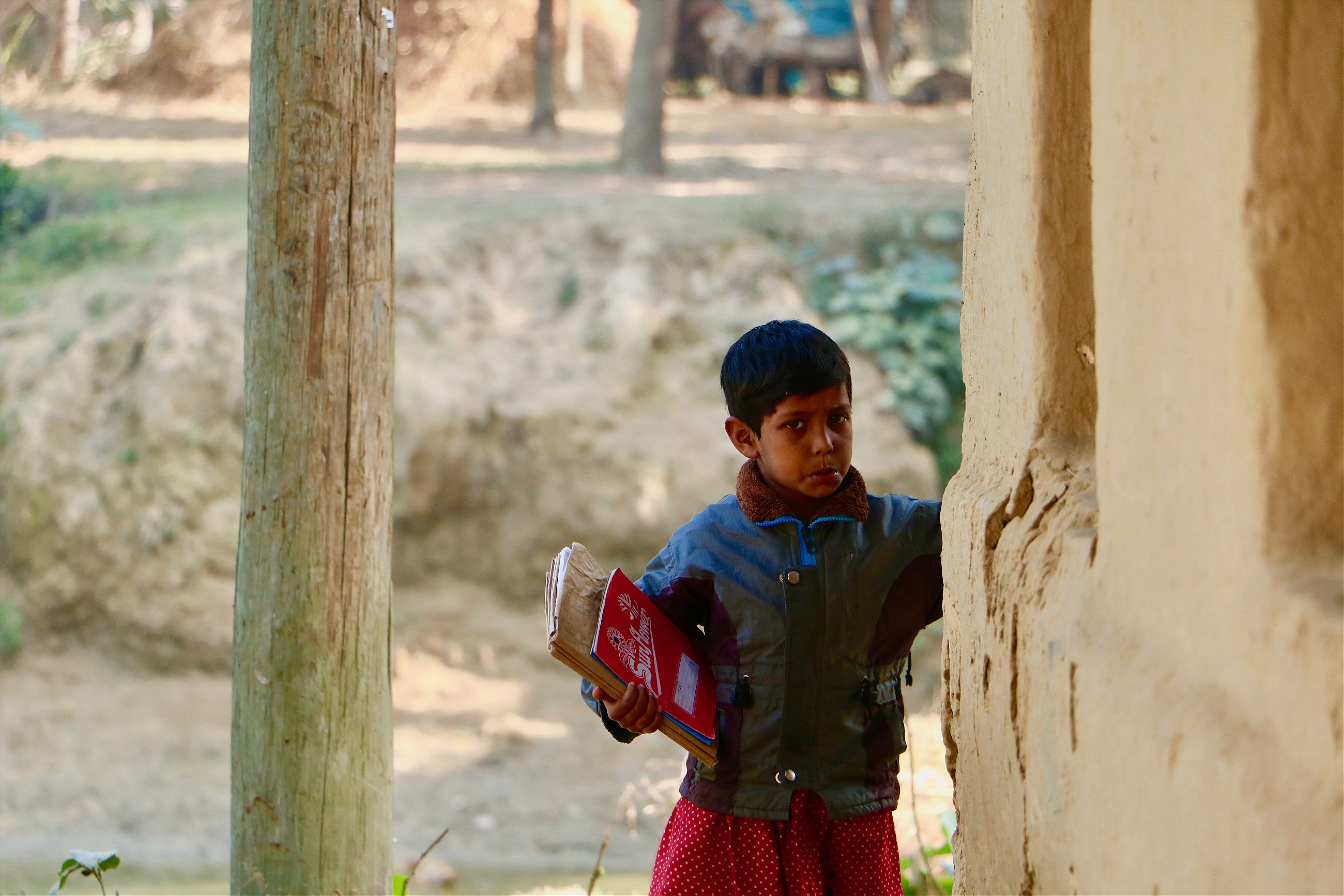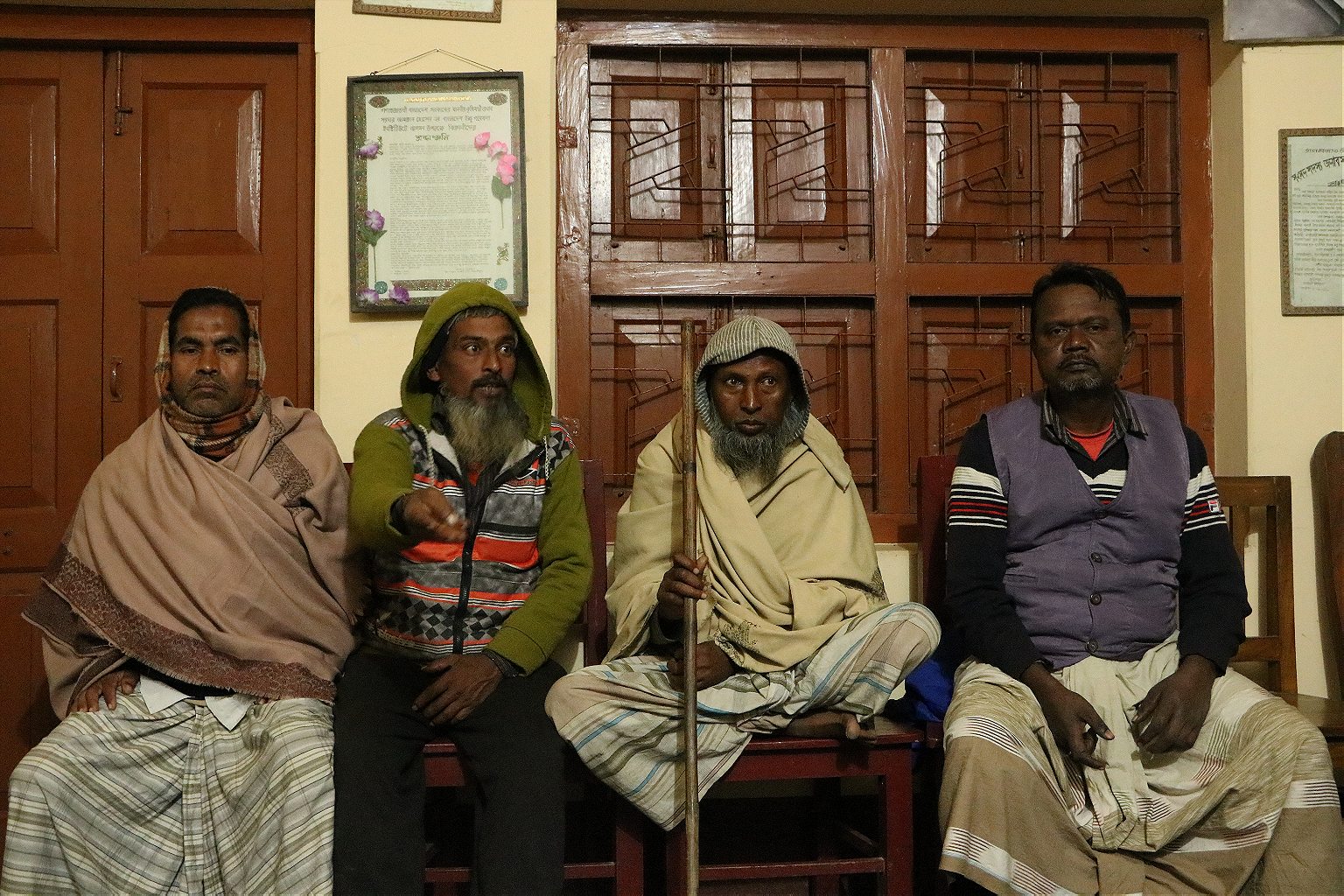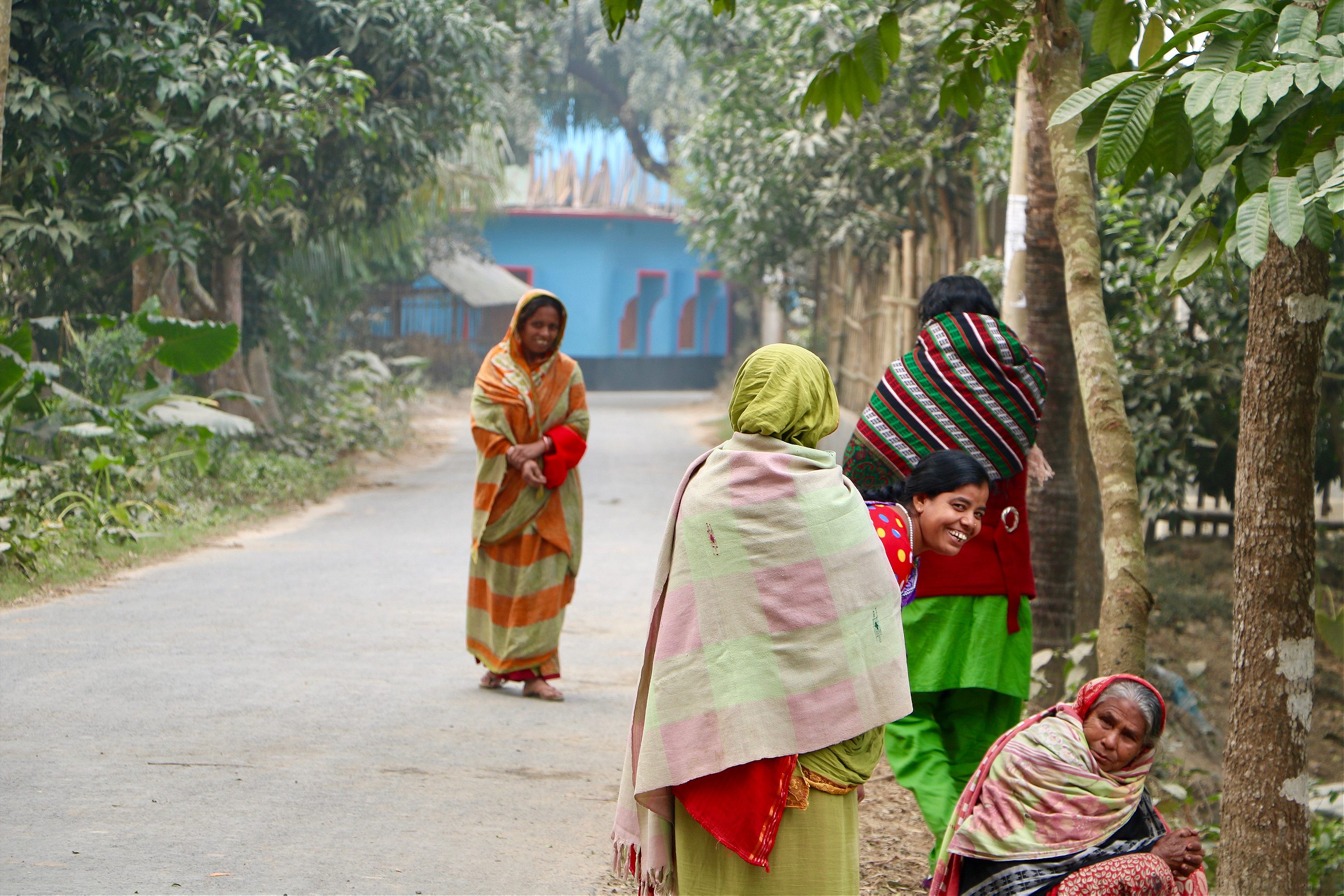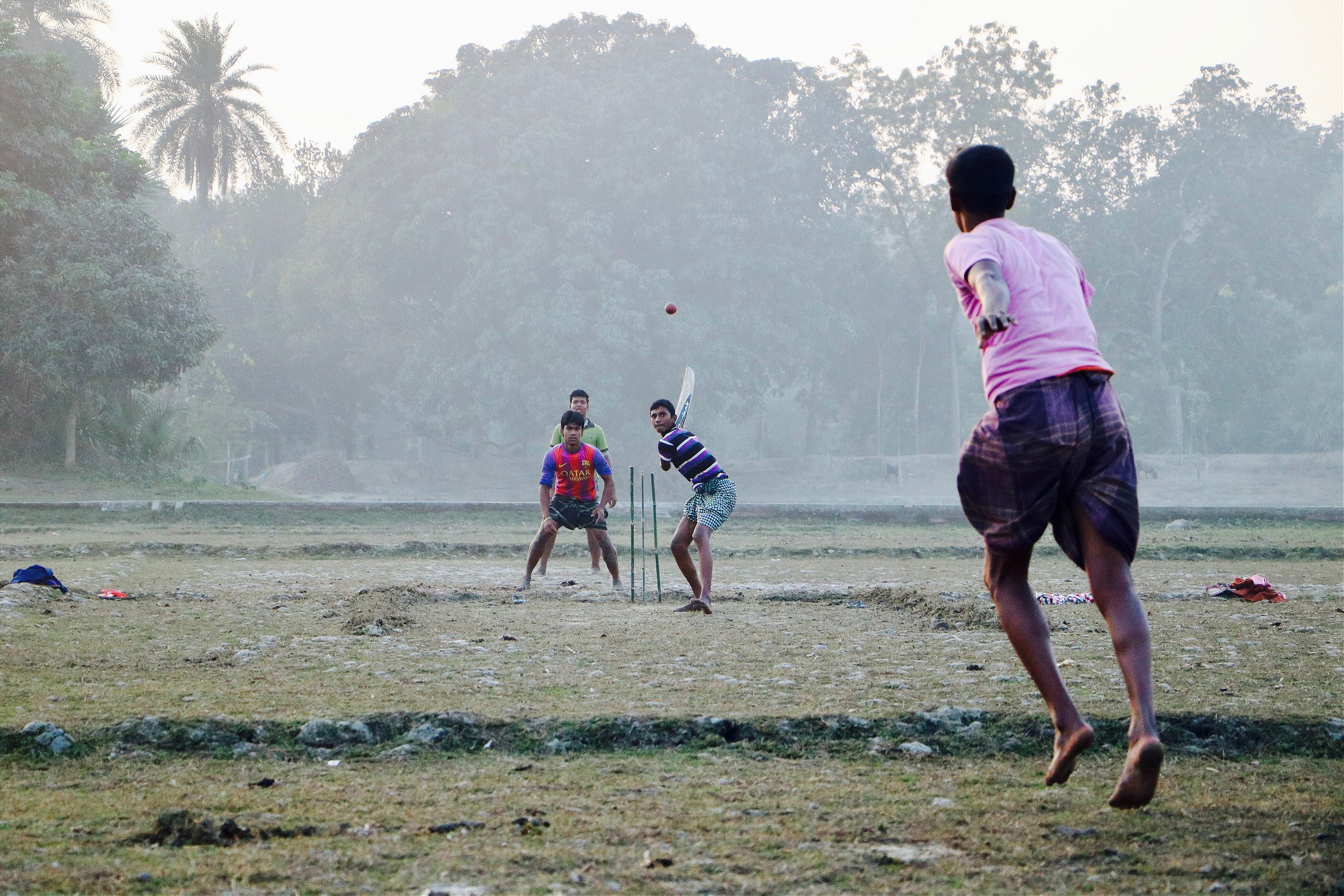In a town previously ruled by a ruthless Islamist, even a cricket tournament can be a welcome respite.
BAGMARA, Bangladesh—-
“Beautiful.”
The word slipped out. I hadn’t meant to say it. The fog-smothered wetlands looked deathly and not beautiful at all.
My phone said I was facing east and it was quarter past sunrise. But there, at the edge of that vast wetland—which Afzal and his people call the beel—there was no sun that I could see. In fact, no sky either. The silver-grey slush of cold mud flowed into a vast shallow sea of still, turbid waters, and the waters merged into the fog shrouded skies; a cold, wet continuum in grayscale.
A little embarrassed, I turned my head to check Afzal’s reaction. But my swarthy, stick-thin guide showed no signs of having heard me. Like me, he was staring into the haze.
“The beel is as dangerous as it is beautiful,” Afzal muttered after a long while.
The next moment he stood up and walked to the edge of the hard earth, and sweeping his rough cracked finger across an imagined horizon said: “They’d come from there. First the pirates, later dacoits”—armed bandits—“and then the Maoists. They would run amok in the village: looting homes, beating people. They didn’t really have much to loot, so they’d make off with the paddy harvest or maybe someone’s chickens and goats. When the police came, they’d disappear into the beel. It’s always been like that.”
“Did Bangla Bhai hide in the beel, too?” I asked.
“He didn’t have to hide from anyone. Least of all the police. Come on. The visitors will be assembling soon.”
And pulling his headscarf back up to his nose, without waiting for me, Afzal began walking back to the village with long, flamingo-like strides on the porridge-y mud. I scrambled in pursuit before my guide disappeared into the grayness.
***
The story that brought me to Bagmara, the erstwhile seat of the Islamic Caliphate set up by the Bangladeshi al Qaeda affiliate in 2004, didn’t begin in the beel. It had begun five months back in Dhaka at the site of a terrible hostage crisis.
Like the German Bakery in Pune and Café Leopold in Mumbai, the Holey Artisan Bakery in Dhaka seems—in hindsight—like an obvious place for attention-seeking Islamists to attack.
Holey was a high-end restaurant in a country struggling with poverty. Nestled in the heart of the diplomatic enclave and sitting beside the long, green Gulshan Lake that flows like a river through the heart of Dhaka, Holey sat like an Elysium of quiet, green opulence in a city overridden with the pandemonium of impoverishment. Flour-dusted baguettes, tuna salads, Danish confectionaries: it served Western fare at big-ticket prices, and thereby became a haunt for the city’s crème de la crème.
Islamists, on the other hand, called it a “den of vice” and planned their assault. What had begun as an idyllic dinner on the balmy evening of July 1, 2016, ended in a bloodbath in the wee hours of the following day, leaving 22 people dead.
Even before the smoke and dust had settled, the Islamic State (IS) claimed responsibility via their online mouthpiece, the Amaq. Releasing pictures of six young men in their twenties posing with IS’s black flag, the emir—meaning commander or ruler—for the Bengal region, Shayk Abu Ibrahim Al Hanif, hailed them as martyrs to the cause of building the Caliphate.
Headlines shrieked. Pundits spouted wisdom on prime time. Islamist parties gave mealy mouthed responses and the government promised vengeance. And before the week had ended, almost everyone outside of Dhaka or personally unaffected by the incident forgot about it.
But I was interested in learning more about the attack. For months on end, I interviewed dozens of people and read a giddying amount of newspaper archives and websites. But as horrible as the attack was, it was just another terrorist attack in a world that was burning every day, every moment. An attack on a touristy landmark claimed by a global jihadist organization, hysterical headlines, expressions of condemnation by the West, the derailing of democracy and civil rights: it was all the same, a microcosm of the global War on Terror.
Little came my way other than canned government responses or partisan rhetoric, until I met Sharmee Hossain, a linguist. She was a professor at the North South University, where one of the IS militants who attacked the bakery had been a student.
“You won’t find your answers here,” she’d said, sipping tea the day I met her in Dhaka. “Come with me to Bagmara. I’m organizing cricket matches there.”

Five days later, I was on a train with Hossain.
Following a hurried breakfast of diced potatoes cooked in a thick yellow soup of split peas accompanied by greasy, wheat-flour flat bread and chai, we took our seats. And nearly an hour after the scheduled departure time, the train blew its horn and lurched to life, leaving behind the refuse-strewn railyard to make its way northwest through the morning fog.
Hossain nodded off soon after and I pulled the out a collection of essays written by her father—independent Bangladesh’s first minister for education and propaganda and longtime parliamentarian Sardar Amjad Hossain, who hailed from Bagmara.
Hossain’s famed father had been a trained journalist before joining the Liberation War under Bangladesh’s founding father, Sheikh Mujibur Rahman. The book detailed a time when nationalists had won against the occupying Pakistani army only to have the guns turned on them by those they called brothers as the war descended into internecine fighting.
“Problem is the guns never went away,” a villager would later tell me, his right arm hanging dead. He was one among the scores of ‘visitors’ who would come to tell me stories of their lives under the Caliphate, holding up their broken bodies as proof.
But I’m getting ahead of myself. Back to the train.
During the Liberation War of 1971, the vast majority of Bengalis joined together as one in fighting off the Pakistani military establishment, which had sought to obliterate the Bengali language. But once that was accomplished, there was little agreement on what their new nation would look like.
Ideas ranged from a Soviet-inspired, one-party state under Sheik Mujib’s Awami League (of which Amjad Hossain was a member) with Bengali-ness as national identity, to a militaristic one under General Zia-ur Rahman, with less Bengali-ness and more Muslim-ness. Yet another group wanted China’s Chairman Mao, uniting under the slogan “China’s chairman is our chairman.”
And the guns—which the Indian army had given to the liberation warriors to battle their longtime enemy, Pakistan—were kept by the different parties to be used against each other.
I don’t recall how much time had passed since we left Dhaka, but the rusty beast we were riding was hurtling past the Teesta River and I was reading about Sardar Amjad Hossain and slaughtered tradesmen and revolution when his daughter woke up.
We were all Muslims, just as we still are. But the political ‘ism’ wasn’t around.
In a low voice, she said: “By the time I grew up, baba was too big a man to be a regular father. I would go to Bagmara with my mother only when school was off.”
Threatened by the Maoists due to his burgeoning political career, Amjad Hossain had resettled in the capital with his family.
“But I remember a much happier Bagmara than the one I see now,” Hossain continued. “We were all Muslims, just as we still are. But the political ‘ism’ wasn’t around. Let alone be locked inside a burqa, women had a very strong voice. They’d play sports as well.”
Amjad Hossain was a modernist; scientific education and organized sports were central to his agenda. Though unlike her father, Sharmee Hossain steered clear of participating in politics directly, she still felt a strong responsibility to her community. She was currently engaged in helping to fund and organize cricket matches in the town, viewing the effort as a continuation of her father’s unfinished work. While the games were hardly a cure for the ills her town had suffered in recent years, it was a start.
***
Following the 1971 Liberation War, Bangladesh had more-or-less set course towards becoming a secular, progressive nation. Bagmara was no exception. But that changed in 2004, when the Islamist commander Siddque-ul Islam moved in with his mujahideen, made Bagmara the seat of his Islamic Caliphate, and declared sharia—not the Bangladeshi constitution—as the law of the land.
“I never saw that man pray, not even on Fridays,” a survivor in the town told me of Siddique-ul Islam. “The sharia was what he felt like at that given moment.”
“Look at this poor devil,” Amjad—my second guide—said, pointing to his bedridden neighbor. “The man can’t even shit and piss. Tell him, Musa…tell him how they beat you.”
Musa couldn’t talk. Lying on the charpoy, he could do little more than gurgle, and froth collected at the edges of his misshapen mouth. His overworked, underfed wife wept from behind. But the mangled legs he held open for me to see told me enough.
“He was always a dim wit,” Amjad said. “He knew nothing of who had taken control and how the laws had changed. And one afternoon, walking past Bangla Bhai and his men, he lit a hand-rolled leaf cigarette. They took it as an act of insolence and punished him by hanging him from a mango tree and beating him with rods and staves till his spine broke and the flesh on his legs hung off the bone.”
Born to a poor family, Musa owned no land and worked in the fields of others for a living. Just as we were stepping out of his dingy home, Musa hailed us back by rattling his spoon-in-a-steel-bowl makeshift bell and gurgled something frantically to his wife.
“Please tell people outside to help with medical expenses,” she translated. I nodded.
Siddique-ul Islam had been a member of the student wing of Bangladesh’s largest mainstream Islamist party, the Jamaat-e Islami. He left them when they started admitting women members and together some other zealots formed the Jamaat-ul Mujahideen Bangladesh. The name that Amjad used for him—‘Bangla Bhai,’ meaning Big Brother of Bengal—was his nom de guerre.
His mujahideen force was a joke in the beginning. They hardly had any guns and moved around in modified tuk-tuks. But against an unarmed peasantry, with some calculated blindness on the part of the ruling party thrown in, Bangla Bhai was a mighty man. He and his cohorts took over the surrounding region and imposed a religious curfew.
The local school was turned into a prison and torture center.
All forms of non-religious social gathering—including singing, plays, and sports—were banned. Heavy taxes were exacted from the villagers. Those too poor to pay had to part with their grains and fowl. Women were put under strict dress codes and forbidden from stepping out without male supervision. Young girls were banned from going to the madrasa.
In fact, the local school was turned into a prison and torture center.
Anyone who dared step out of line was brought to weekly kangaroo courts presided over by Bangla Bhai and severe punishments—from beating with rods to summary executions—were meted out.
“They said I was a Maoist,” the man with the dead hand said. “Me a Maoist? I was under threat from them for being pro-Amjad Hossain! Yet Bangla Bhai took me in and asked me to pay a fine for my crimes against Islam. The sum they asked for wouldn’t come together even if I had sold everything I owned, including myself, my wife, and child. So they hung me from the tree and gave me a battering. One guy would beat me, tire out and another would take over. I was lucky, I passed out. All the others they took in that day never came back.”

“Bangla Bhai was allowed to do what he did because he was doing the government’s dirty job by hunting down the Maoists,” Hossain had explained to me on the train.
Bangla Bhai had been given complete impunity as long as he had stayed within the confines of Rajshashi, the district in which Bagmara is situated. That understanding continued until 2005. In August that year, his team conducted coordinated bombings in roughly 500 locations around Bangladesh. And in November, he killed two sitting judges and attempted a suicide attack.
Thanks to the shabby state of Bangla Bhai and his ragtag team, the bombings caused relatively few deaths and the suicide missions were duds when compared to the battle-hardened mercenaries of al Qaeda. But he’d made his intentions clear.
Bangla Bhai was turning his attention to the capital. The mandarins of Dhaka finally stirred and the Rapid Action Battalion—the main paramilitary unit of the Bangladeshi army—hunted him down in no time. The ‘big brother’ who likened himself to Afghanistan’s Mullah Omar was found hiding in a tin shed in Mymensingh, far from his Caliphate.
Bangla Bhai was captured and hanged in 2007, along with six other members of his group.
***
“Won’t you come in and have tea?” Najma and her elderly mother asked me in Bagmara. I had just met them, but in Bangladesh, inviting a stranger into your home and offering him a meal is nothing odd, and the stranger refusing is an injury never forgotten.
Najma’s ancestral home was right next to the infamous mango orchard where Bangla Bhai held his kangaroo courts. Before he overran the school, her home that had been used by the terrorists as a sort of base.
“Of course I remember all that happened when Bangla Bhai was here,” she said, which surprised me, given her youthful appearance.
“Bhai? When did that rascal become your bhai?” her mother interjected. “If I’d borne such a baby, I’d kill it in the crib.”
Life had been hell for the women during his reign.
“How does one work in the fields with a full burqa in this hot and sweaty country?” one woman asked me as she stood in a cluster of women collecting water at the communal tap.
They’d been giggling at me and my camera when they first saw me and refused to talk. But Najma’s mother’s bold words had helped them relax.
“They wouldn’t let us step out without male supervision. When the man is in the fields, how does a woman carry his lunch to him?” one woman asked.
Back in the days of the Caliphate, a woman was riding pillion on her husband’s motorbike on the same road where we were standing and talking. The couple had been beaten to a pulp because the wind had revealed a patch of her midriff.
“The cries, brother, the cries … we can still hear them,” one of the women said, pointing out the tree from which people were hung upside down and beaten while others watched. Not watching was a punishable crime, too.
While we stood silent among the trees, I imagined the corpulent Bangla Bhai sitting at the far end, relishing the pain of stick-thin Musa being bludgeoned.
“Things are better now,” another woman said, breaking the silence. “We can bathe in the ponds again.”

The rustling of movement began again, but not the giggles.
“The armed combatants were killed, but their local enablers are very much around leading normal lives,” one of the men in the village told me, a sentiment repeated by many others. “In fact, many of them have wiggled their ways into all the mainstream parties and are simply waiting for the right time to regroup.”
After abandoning Najma’s familial mud house, Bangla Bhai moved to the largest concrete structure in the village—the Hamirkutsa Government High School.
“We were on a short vacation,” the school’s assistant headmaster told me over tea with some of the other teachers. “When we returned on a Monday, we found half of it taken over by them. And then they began using this as both their command office and torture center.”
Conveniently for Bangla Bhai, the school, too, had a sturdy mango tree in the courtyard.
“Later that week, we all went to Bangla Bhai and requested him to not do any of their things during the daytime. And he kindly agreed.”
The children had gone into a fit of collective fear the first time they’d heard the howls of a prisoner being broken. A stampede ensued and some had tried to jump off the second-floor balcony.
Exams were excused that year.

“Bangladesh is just waiting for a dictator.”
Hossain was thinking aloud, sitting in the small courtyard after dinner on the first night in Bagmara.
The village was silent, silent enough for me to hear dew dripping onto the tin roof and the cat purring as she rubbed her arched back against Rabeya, the housekeeper. Rabeya spoke very little, smiled a lot and cooked beautifully. She had survived the Caliphate and two terrible husbands but said little about either. ‘Men do such things’ was the gist of what she told me after much prodding.
“It’s not victimhood that’s driving the young men to terrorism,” Hossain had said to me back in Dhaka, explaining the phenomenon of rich young men from her university being members of the Holey Artisan attack team. “It’s the macho persona that attracts them.”
This, for Hossain, was a recurring theme in Bangladeshi life. Pockmarked with coups, wanton partisan violence, and religious politicization, Bangladesh has taken a tortured path to democracy. Though much has been gained in public health, education, food security and the like, democratic institutions are weak and beholden to partisan agendas. Individuals with sufficient money, muscle or political influence can do as they please with little fear of the law.
“These kids need better idols. They need [activities] they can spend their energies around. And I’d rather make that cricket instead of jihad.”
Through her elder brother, who is a TV producer, Hossain was trying to rope in some cricketing stars to come in and add a touch of glamour to the event, which is funded primarily by the two siblings. These annual games give the young men of Bagmara an opportunity to both compete and come together as a team, far from the influence of Islamists.
During our time in Bagmara, many people came to see Hossain. She met them in a small outbuilding below a larger-than-life portrait of her father. Many asked her why she wasn’t seeking office herself; she shunned all talk of politics, but doled out money, tea, and advice.
Late one afternoon, a bunch of young boys came by, cricketing enthusiasts all.
There was to be an inter-village tournament. If there was enough money, they’d rent floodlights and, like the stars of the Bangladeshi cricket team, they’d play a ‘day and night match.’ If not, it would be Twenty20 cricket, a shorter version of the game. At any rate, they needed bats, balls, and a roller to even out the hard, lumpy ground adjoining the village.
“During the rains, Bagmara looks like an island,” Afzal had told me on our way to the beel. “The waters come up to the edge of the village and waves lap against it.”
Rimmed by tall palms, the village stood several feet above the fields that led to the beel. But in the fullness of winter, the waters of the beel had receded many miles, and the resulting exposed earth was a gradient of hardness that went from solid and lumpy to soft slush.
On the slim band of land just right for farming, a crop of paddy rice had already been harvested. The onion crop was just about ready and the first verdant rows of potato plants had sprouted. A clutch of other vegetables, including snake gourds, bitter melons, chilies, and pumpkins grew as well; not enough to sell, but destined for the savory, five-spiced veggie mélanges villagers made for lunch.
Each afternoon, a riotous noise erupted in the fields.
Three bamboo sticks driven into the ground made for the wicket at the striker’s end, where the batsman stands. The non-striker’s end—from which the ball is thrown—was a misshapen stone with some sweaters covering it. One lanky young man was running down the pitch and delivering a wayward ball, another was taking blind swings with a worn-out bat at every delivery that came his way, and a set of barefoot outfielder fielders ran all over, even though their feet bled from sharp stumps left behind from the paddy. It was cricket time!
Anger, untamed aggression, jubilation, despair, curses flying fast; forget fine English definitions of cricket being a gentleman’s game—this was the sport at its finest. While the annual matches are Hossain’s project, these informal matches pop up nearly every afternoon.
There was action off the field as well. While the young men played, the girls watched from the village edge and grown-ups let loose volleys of abuse every time the ball was hit into the crops.
The energy was contagious. Everyone got sucked in, including this reporter.
“Go bat. Let’s see if you Indians are really any good,” Hossain said. It was our last day in Bagmara and she, along with Rabeya and a few other women from the neighborhood, had come to the fields.
Challenged on both my masculinity and nationalism in one go, I handed the camera to Afzal and valiantly jumped into the fray—and in no time, made a complete fool of myself. But the kids weren’t half bad.
Do you think if people read your story they’ll help me?
Later that night, I was treated to a feast. Rabeya cooked duck—a winter specialty—in a mildly spiced curry of grated coconut. The duck was alive when it came to the kitchen and the coconut was from a tree right outside the front yard. Neighbors chipped in with dishes cooked in their homes for the ‘guest’ from abroad. Desert—steamed and fried cottage cheese balls in syrup—were from Afzal’s brother-in-law’s shop.
“Sid,” Hossain said in the car on our way back to Dhaka. We were, by then, safely outside Bagmara and she had reverted back to using my real name. Throughout my time in the town, on her instructions, I’d identified as Saeed and had worn a beard in the Muslim style.
“I really want these cricket matches to happen regularly. But I don’t know where the funds will come from. Do you think if people read your story they’ll help me?”
The headlights were fighting a losing battle against the darkness and heavy fog which had blanketed the unlit roads and the fields beyond. Visibility had gone down to under ten feet. There in the silent, pensive confines of the car, I thought I saw Hossain and her cricket matches more clearly. Were the cricket matches she and her brother funded just some charity work? Or was it that in going back to Bagmara, in continuing his work for the town, she was taking on the mantle of her dead father?
At any rate, I didn’t know the answer to her questions. So, like I’d done to Musa, the man with the dead hand, and innumerable others who thought me telling their stories would change their lives, I mumbled and nodded.